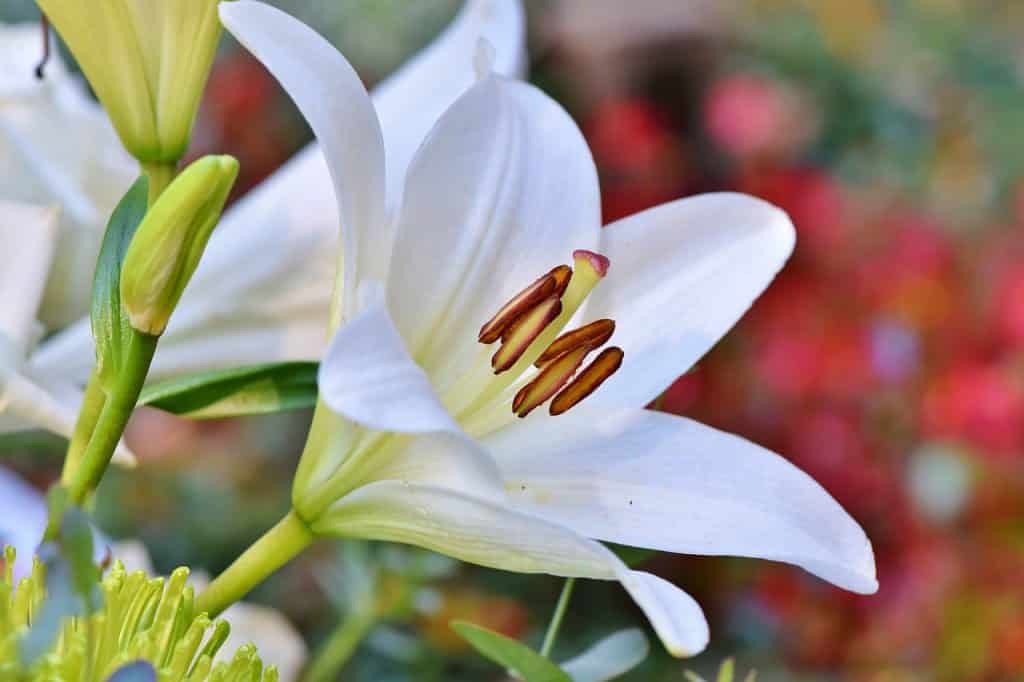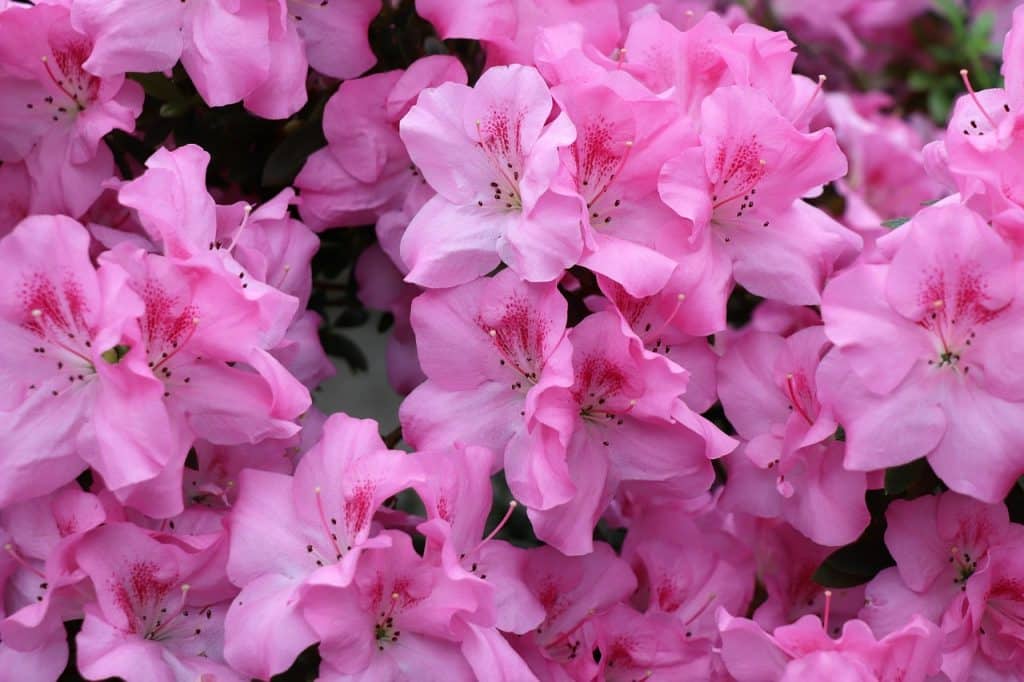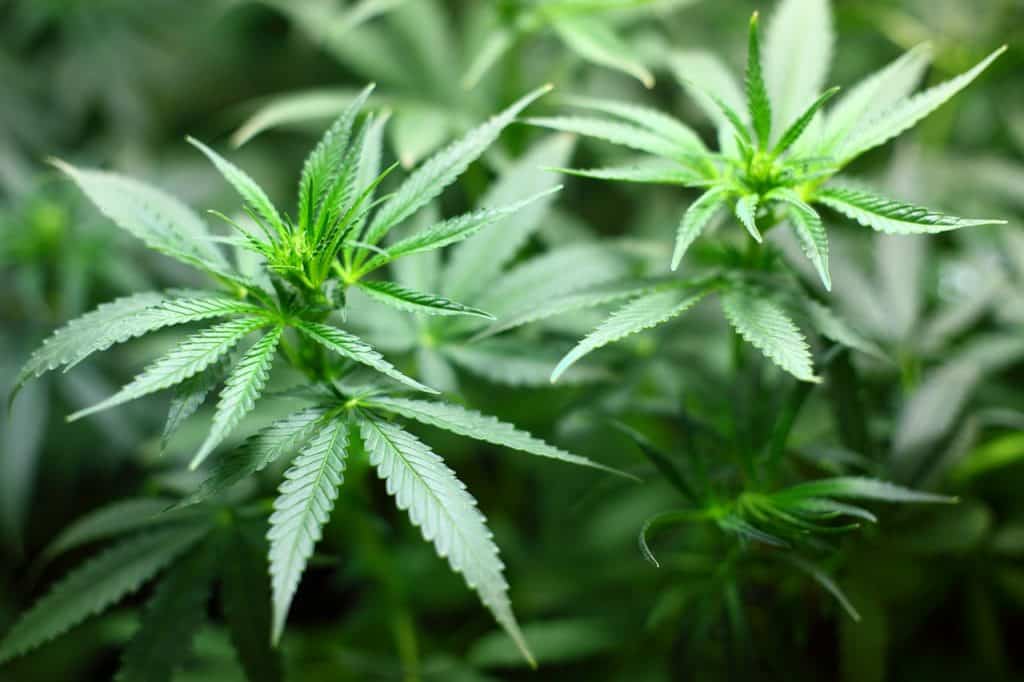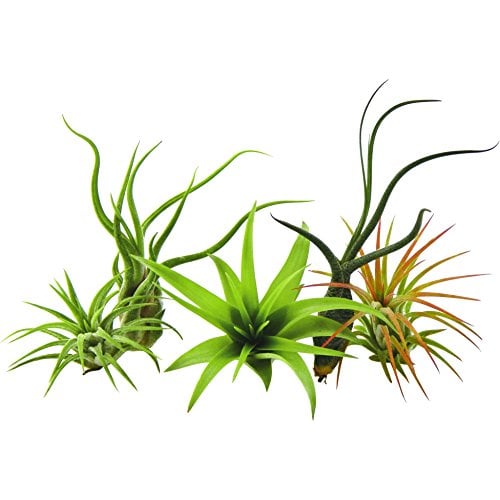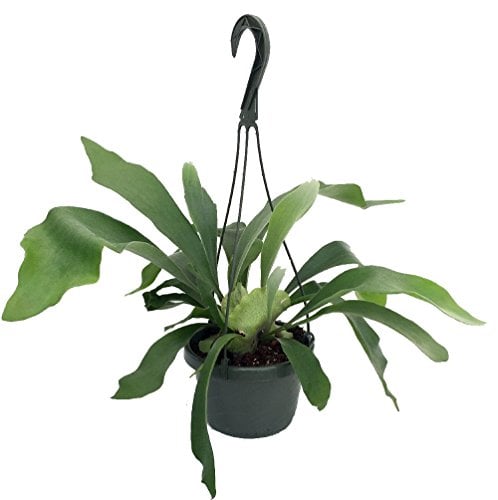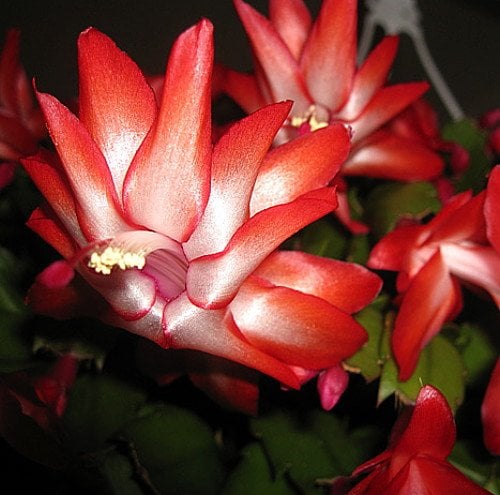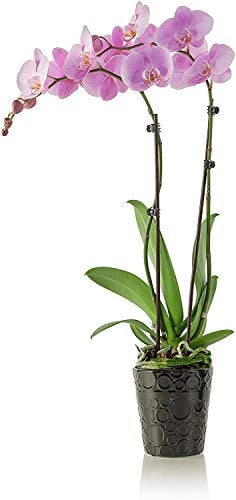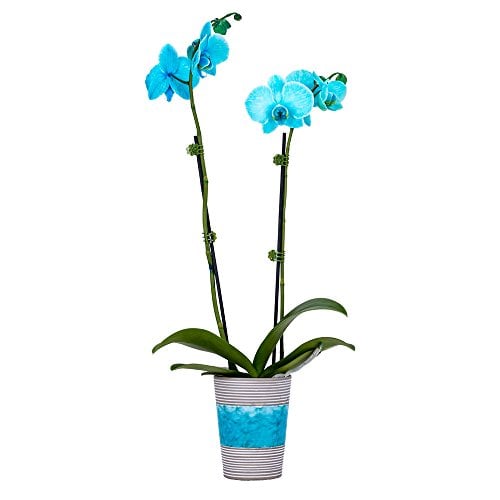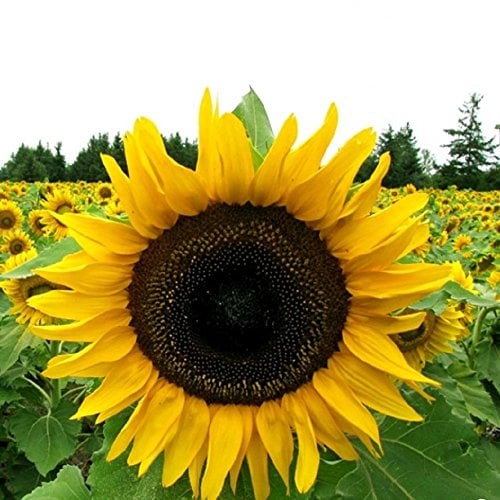- This post contains affiliate links. Read more here.
- Not a substitute for professional veterinary help.
Last fall, one of my wife’s students surprised her with a bouquet of lilies and roses. It looked gorgeous on the kitchen table, and when our nine-month-old kitten Lily batted at the flowers playfully, we cooed over how cute it was that Lily was playing in the lilies.
A few hours later, I noticed Lily chewing on some fallen lily petals. I’m a pretty relaxed pet parent, so I didn’t think much about it. Thankfully, my wife was wise enough to look it up. A quick internet search raised concern, so she texted a veterinarian friend. The vet’s reply was immediate and urgent: “TAKE HER TO THE VET. NOW!”
Which plants are harmful to cats?
Believe it or not, the ASPCA lists 417 varieties of plants that are toxic to cats, as well as 569 that aren’t toxic.
I found this shocking—how do any cats live long, healthy lives if they are surrounded by potentially dangerous plants?
It’s partly in the definition. Toxic means that a plant can cause harm, but the type and severity of harm vary widely. Some toxic plants cause a skin rash or vomiting that is irritating but not dangerous in the long term, while others can cause severe damage to internal organs, leading to life-threatening problems like kidney failure.
To sort it out, I did a lot of reading and enlisted the help of Los Angeles holistic veterinarian Dr. Patrick Mahaney.
Why do cats eat plants?
Cats are carnivores, right? So why in the world do they eat plants? “There could be a nutritional deficiency in a cat’s a diet that promotes him to snack on plant material,” Dr. Mahaney explains. Cats could also be looking for more moisture in their diet, particularly if they primarily eat dry kibble at meals. Or your cat could be feeling nauseated and looking for plants to help induce nausea on purpose, he says.
Most negative interactions between cats and plants happen when the cat chews on or eats a plant. Skin contact can sometimes cause irritation, as well. “Some plants, like the pencil cactus (Euphorbia tirucalli), contain a milky sap that can cause dermatitis (skin inflammation) upon contact with areas on the body that have reduced hair as a protective mechanism,” Dr. Mahaney says. Similarly, just like humans, poison ivy and poison oak might cause itchy, blistering skin reactions in cats if the toxic oils can get through the cat’s fur.
Avoid these plants if you have a cat
From the ASPCA’s list, we investigated some of the most dangerous plants that your cat is likely to encounter.
1. Lilies
Lilies have such a bad reputation for being toxic to cats that Pet Poison Helpline has a dedicated education campaign called No Lilies for Kitties. In his own practice, Dr. Mahaney is no stranger to lily reactions in cats. “I have seen a variety of toxic exposure secondary to cats eating plant material, but lily-induced toxicity is definitely the most common,” he says.
Lily poisoning causes acute kidney failure in cats. All parts of lily plants are toxic, including leaves, roots, petals, and pollen. Even the water from a vase of lilies can be toxic. This is true of particular lilies (those classified in the genera Lilium and Hemerocallis), including the familiar Tiger lily, Easter lily, Daylily, and Stargazer lily. Other types, including Calla lily, Peace lily, and Peruvian lily, are much less toxic to cats, causing irritation to the mouth and stomach, but no lasting damage.
How do lilies cause liver damage? “The toxic principle and mechanism of toxic action that lilies have on our feline friends is unknown, but the plants cause damage to kidney cells and quickly lead to potentially irreversible kidney failure,” Dr. Mahaney says. Hmm, a mystery. It sounds like a good project for an aspiring veterinary toxicologist!
2. Sago palms
Sago palms look like bonsai palm trees and go by many names: coontie palm, cardboard palm, cycads, and zamias, and they are classified in the genera Cycas, Zamia and Macrozamia. They’re common house plants, and they’re also planted in outdoor gardens in sub-tropical regions like California and Florida.
All parts of Sago palms are toxic to cats, because all parts contain a toxic agent called cycasin. Cycasin poisoning can result in gastorintestinal distress, followed by nervous system symptoms and severe liver damage. The Pet Poison Helpline warns that if a cat or dog eats Sago palm, it needs immediate medical attention—and even pets who are treated quickly and attentively only have a 50 percent chance of surviving the incident.
3. Azaleas & Rhododendrons
Here in Seattle where Lily and I live, you can’t throw a rock without hitting an azalea or rhodie shrub. Very closely related, these plants are both classified in the genus Rhododendron. For cats, all parts of these shrubs are toxic when eaten. Grayanotoxins are the culprit, causing tremors, seizures, abnormal heart rate, and vomiting, among other symptoms. Fortunately, most cats recover when they receive prompt veterinary treatment.
4. Dieffenbachia (Dumb Cane)
This common leafy houseplant with two-tone leaves is a staple in hotel lobbies and sunny windows worldwide. If a cat bites the plant, insoluble calcium oxalate crystals are released. These tiny, needle-sharp crystals cause mild to moderate irritation to the mouth and digestive tract.
On rare occasions, the crystals cause swelling to the cat’s airway, making it difficult to breathe. Most Dieffenbachia exposures are mild to moderate, but some are very serious.
5. Cannabis
You might not be surprised that when a cat chews on a cannabis plant, he can get uncoordinated or sleepy. Medical cannabis is used for cats, particularly CBD oil, which PetMD discusses as a remedy for inflammation, anxiety, and pain.
But CBD oil is a refined product that does not contain the psychoactive THC that the plant is known for. In addition to disorientation and sleepiness, chewing on a cannabis plant can cause a cat to have vomiting, low blood pressure, seizures, and even coma. In rare instances, cats have died from cannabis exposure.
As legal recreational and medical cannabis get more and more common, it’s important to keep out cats away from these potentially dangerous plants.
Also: Watch out for holiday plants!
Mistletoe, holly, and Amaryllis are all dangerous for cats. Springtime bouquets often feature Easter lilies as well as daffodils, tulips, and paperwhites, all of which carry risks if eaten by cats.
What to expect if your cat eats the wrong plant
If your cat eats a lily or other toxic plant, Dr. Mahaney shared the potential treatments that might be used by your veterinarian:
- Decontamination. An emetic (vomit-inducing) medication or a cathartic like activated charcoal can be used to remove toxins from the digestive tract.
- Diuresis. IV or subcutaneous fluids might be given to flush toxins and metabolites out of the body.
- Monitoring. The veterinarian will test the cat’s blood for signs of kidney failure, such as elevated levels of metabolites that are normally cleared by the kidneys. The vet might also monitor urine output to determine if appropriate amounts of fluid that enter the body are exiting as urine.
Older cats might not respond to treatment as well as younger cats because most cats develop kidney disease in their senior years, Dr. Mahaney says. When the kidneys aren’t functioning properly to begin with, it makes it more difficult to get a cat back to good health after toxic exposure.
Safe plants for cats
Some common houseplants that are safe for cats from the ASPCA’s extensive plant list include:
1. Spider Plant
Shop on Amazon2. African Violet
Shop on Amazon3. Air Plant (Tillandsia)
Shop on Amazon4. Parlor Palm
Shop on Amazon5. Staghorn Fern
Shop on Amazon6. Hens & Chicks Succulents
Shop on Amazon7. Christmas Cactus
Shop on Amazon8. Phalaenopsis Orchid
Shop on AmazonSafe Flowers for Cats
Pet Poison Helpline suggests these safer alternatives for cut flowers, so you can enjoy a touch of springtime without putting your cat in harm’s way:
1. Daisies (Gerbera and others)
Shop on Amazon2. Orchids
Shop on Amazon3. Rose
Shop on Amazon4. Snapdragons
Shop on Amazon5. Sunflower
Shop on Amazon6. Zinnia
Shop on AmazonBack at my house, my kitten Lily was ok. She spent the night at the emergency vet’s office where she received IV fluids and had blood tests. She survived the ordeal with just a patch of hair shaved from her leg to show for it.
On the other hand, I had a luxury car-payment worth of vet bills to deal with. Now, we have a list of “Not Safe For Cats” food, flowers, and plants on our fridge, and we only keep l roses and daisies on our table.
For more toxic plants to cats, take a look at Rover’s database of poisonous plants for cats and dogs.
